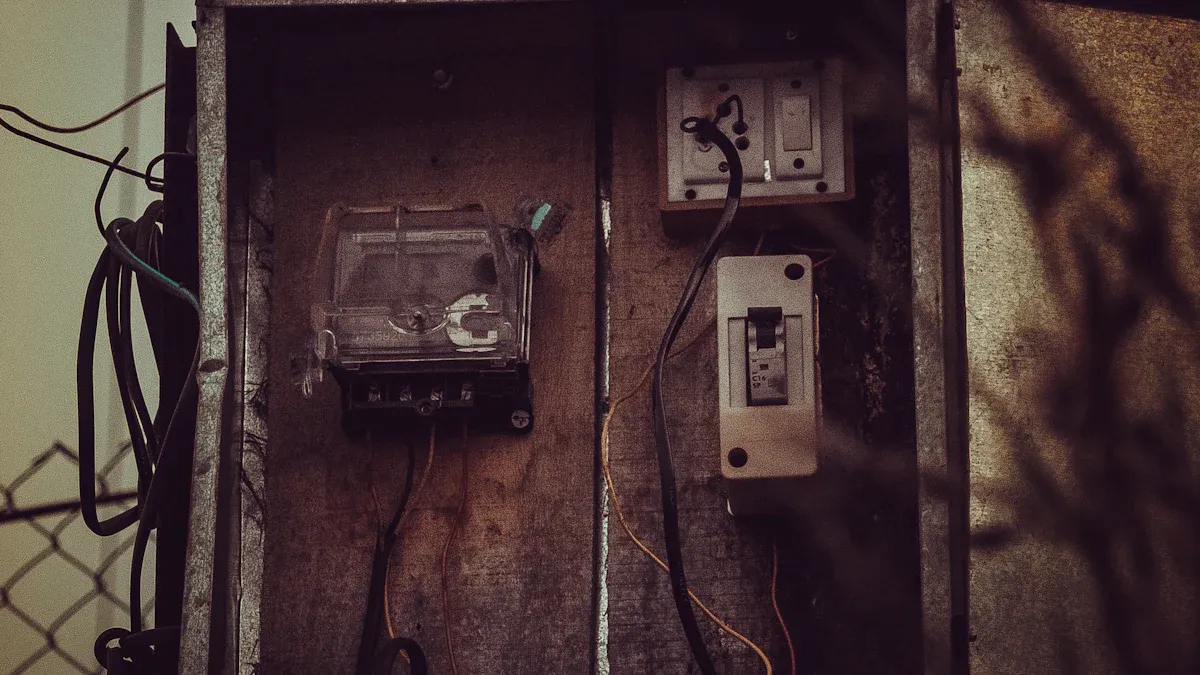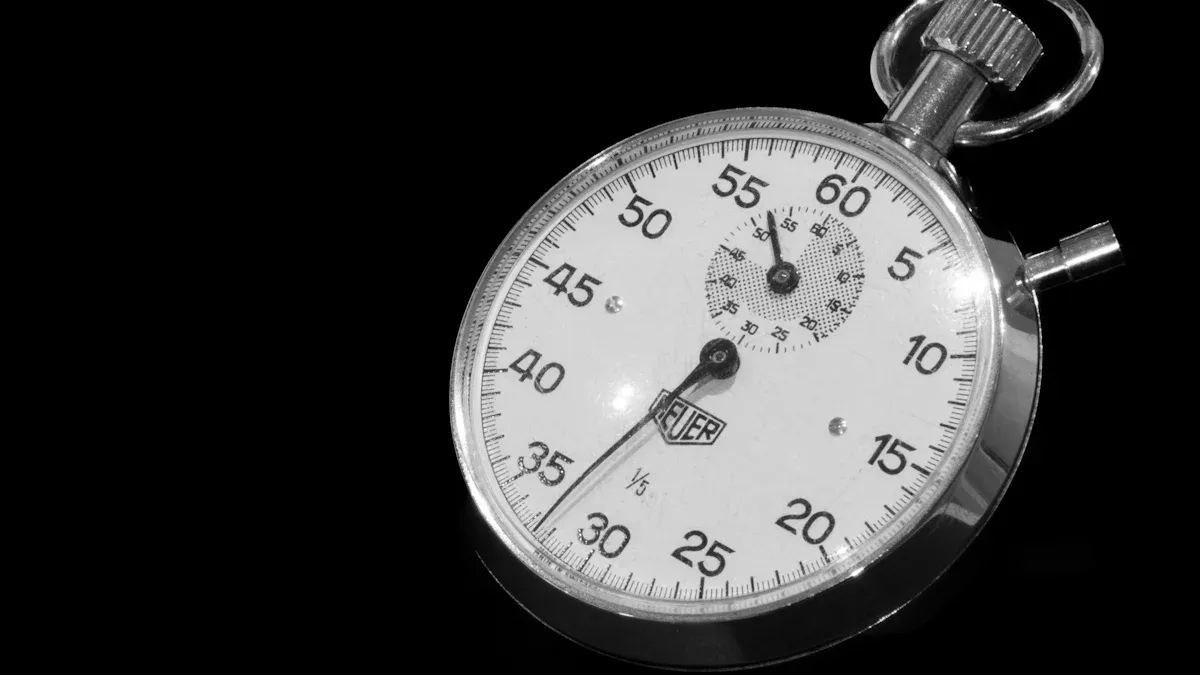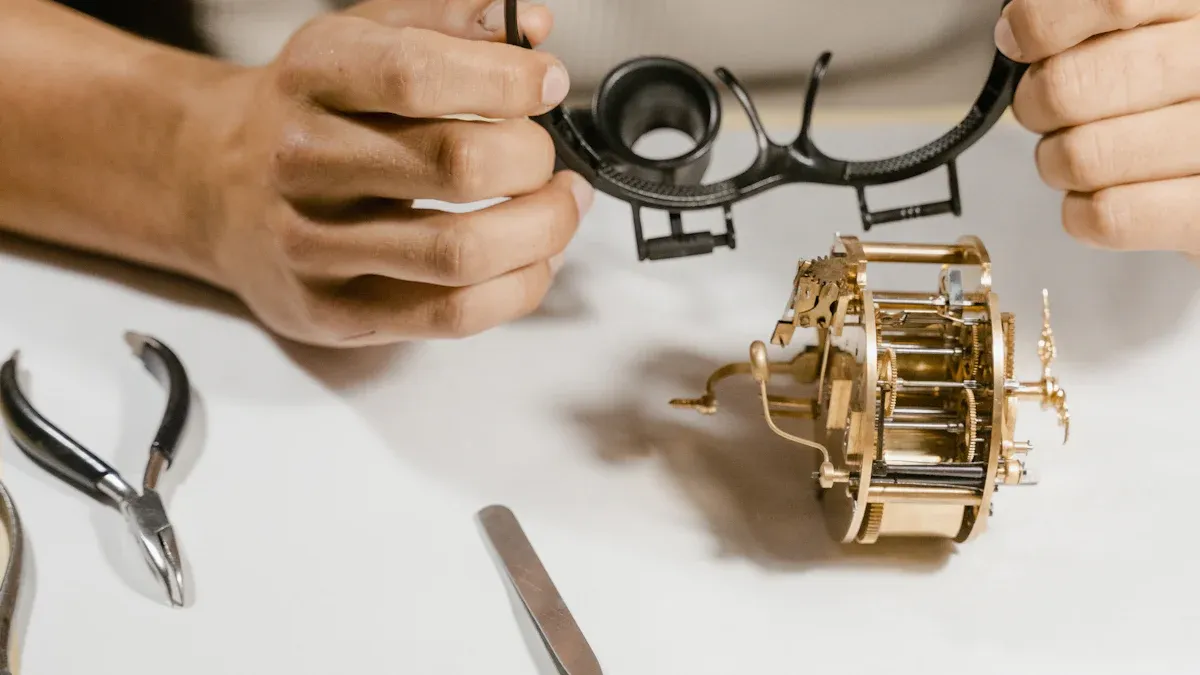
A Magnetic Telephone Hook Switch gives users better reliability than traditional mechanical switches. Many users notice that magnetic switches last longer and need less maintenance. These switches often provide a smoother experience because their design reduces wear and tear over time.
Key Takeaways
- Magnetic telephone hook switches last much longer and need less maintenance than mechanical switches, making them ideal for heavy use.
- Magnetic switches work smoothly and quietly without wearing out, while mechanical switches can stick, wear down, and require regular cleaning.
- For offices and industrial settings, magnetic switches offer better reliability and lower costs over time, while mechanical switches suit basic home use with lower upfront cost.
Schnelle Vergleichstabelle
Reliability and Performance Metrics
A clear comparison helps users understand the strengths and weaknesses of each switch type. The table below highlights key metrics for both mechanical and magnetic hook switches.
| Metric | Mechanical Switches | Magnetic Hook Switches |
|---|---|---|
| Average Lifespan | 50,000 – 100,000 cycles | 500,000+ cycles |
| Failure Rate (per year) | 2-5% | <1% |
| Wartungsfrequenz | High | Low |
| Antwortzeit | 20-30 ms | 10-15 ms |
| Resistance to Dust/Moisture | Low | High |
| User Experience | May feel stiff over time | Consistent and smooth |
Note: These values reflect typical performance in 2025 based on industry data.
- Mechanical switches use physical contacts. These contacts wear down with repeated use. Users may notice sticking or slow response after heavy use.
- Magnetic hook switches use non-contact sensors. These sensors do not touch, so they avoid friction and wear. This design leads to longer life and fewer failures.
Users in offices or industrial settings often prefer magnetic hook switches. They value the lower maintenance and higher reliability. Home users may choose mechanical switches for their lower initial cost.
A quick glance at the table shows that magnetic hook switches outperform mechanical switches in most categories. This makes them a strong choice for long-term use.
Reliability Analysis

Mechanical Switches: Failure Modes and Lifespan
Mechanical switches use moving parts to make or break a connection. Over time, these parts face several common failure modes:
- Contact Wear: The metal contacts inside the switch rub together each time someone uses the phone. This friction causes the contacts to wear down, leading to poor connections or complete failure.
- Spring Fatigue: Springs inside the switch lose their tension after many cycles. A weak spring can cause the switch to stick or not return to its original position.
- Dust and Debris: Dust can enter the switch housing. This buildup interferes with the movement of parts and increases the risk of sticking or jamming.
- Corrosion: Moisture in the air can cause the metal parts to corrode. Corrosion leads to unreliable connections and shortens the switch’s lifespan.
Most mechanical switches last between 50,000 and 100,000 cycles. Heavy use in offices or industrial settings can shorten this lifespan. Users often notice problems like sticking, slow response, or a “mushy” feel as the switch ages.
Tipp: Regular cleaning and inspection can extend the life of a mechanical switch, but this adds to maintenance time and cost.
Magnetic Telephone Hook Switch: Failure Modes and Lifespan
A Magnetic Telephone Hook Switch uses a non-contact sensor, such as a reed switch or Hall effect sensor, to detect when the handset is lifted or replaced. This design avoids many of the problems found in mechanical switches.
- No Physical Contact: The sensor does not rely on moving metal parts. This eliminates friction and reduces wear.
- Versiegeltes Design: Many magnetic switches come in sealed housings. This keeps out dust and moisture, which improves reliability.
- Electronic Component Failure: The main risk comes from electronic failure, such as a faulty sensor or wiring issue. However, these failures are rare compared to mechanical wear.
- Magnet Degradation: Over many years, the magnet may lose some strength. In most cases, this happens so slowly that it does not affect normal use.
Most Magnetic Telephone Hook Switches last for more than 500,000 cycles. Users rarely notice any change in performance, even after years of daily use. The switch continues to feel smooth and consistent.
Note: Because there are fewer moving parts, magnetic switches require almost no maintenance during their lifespan.
Real-World Reliability Data in 2025
Industry data from 2025 shows clear trends in reliability for both switch types. The following table summarizes real-world findings:
| Schaltertyp | Average Lifespan (cycles) | Annual Failure Rate | Common Issues |
|---|---|---|---|
| Mechanical Switch | 50,000 – 100,000 | 2-5% | Sticking, wear, noise |
| Magnetic Telephone Hook Switch | 500,000+ | <1% | Rare sensor faults |
- Offices and call centers report that magnetic switches need replacement far less often than mechanical ones.
- Industrial users prefer magnetic switches because they resist dust and moisture, which are common in harsh environments.
- Home users with low call volume may not notice reliability differences right away, but over several years, magnetic switches show fewer problems.
In summary, real-world data confirms that magnetic switches provide superior reliability and longer service life. Most users experience fewer failures and less downtime.
Leistungsbewertung
Mechanical Switches: Response and User Experience
Mechanical switches rely on physical movement to operate. When a user lifts or replaces the handset, the switch moves metal contacts together or apart. This action creates a noticeable click. Many users find this tactile feedback helpful. Over time, the switch can feel less responsive. The contacts may stick or the spring may weaken. These changes can cause a delay in response or a mushy feeling.
Mechanical switches often produce audible noise during operation. In quiet environments, this noise can become distracting. Some users appreciate the sound as confirmation of action. Others prefer a silent experience. The switch may also require more force to operate as it ages. This can lead to user fatigue, especially in high-use settings.
Tip: Regular cleaning can help maintain the feel and response of a mechanical switch, but it does not prevent all issues.
Magnetic Telephone Hook Switch: Response and User Experience
A Magnetic Telephone Hook Switch uses a sensor to detect the handset position. The user does not feel any physical resistance or hear a click. The switch responds quickly and smoothly. Most users notice the consistent performance, even after years of use. The lack of moving parts means the switch does not change over time.
Users often describe the experience as seamless. The switch activates with minimal effort. There is no noise or tactile feedback, which many people find modern and pleasant. In busy offices or call centers, this silent operation reduces distractions. The switch also works well for users with limited hand strength, since it requires no extra force.
- Consistent response time
- Silent operation
- No change in feel over time
Performance in Demanding Environments
Demanding environments, such as factories or outdoor locations, present unique challenges. Dust, moisture, and temperature changes can affect switch performance. Mechanical switches struggle in these conditions. Dust can enter the housing and cause sticking. Moisture may lead to corrosion. Extreme temperatures can weaken springs or warp plastic parts.
A Magnetic Telephone Hook Switch performs better in harsh environments. The sealed design keeps out dust and moisture. The sensor does not rely on moving parts, so temperature changes have little effect. Many industrial users report fewer failures and less downtime with magnetic switches.
| Environment | Mechanical Switches | Magnetic Hook Switches |
|---|---|---|
| Dusty | Prone to sticking | Resistant |
| Moisture | Risk of corrosion | Sealed, protected |
| Extreme Temperatures | Spring fatigue | Stable performance |
Note: For locations with high dust or moisture, magnetic switches offer the best long-term performance.
Cost and Maintenance Considerations

Initial Cost Comparison
When buyers look at telephone hook switches, they often notice the price difference first. Mechanical switches usually cost less at the start. Manufacturers use simple materials and basic designs, which keeps the price low. In contrast, a Magnetic Telephone Hook Switch often costs more. The advanced sensor technology and sealed housing increase the initial price. The table below shows a typical price range in 2025:
| Schaltertyp | Average Initial Cost (USD) |
|---|---|
| Mechanical Switch | $5 – $10 |
| Magnetic Telephone Hook Switch | $15 – $25 |
Note: Prices may vary by brand and features.
Long-Term Maintenance Needs
Mechanical switches need regular care. Dust and dirt can build up inside, so users must clean and inspect them often. Springs and contacts may wear out, which means parts need replacing. This maintenance takes time and adds to the total cost. Magnetic switches require almost no maintenance. The sealed design keeps out dust and moisture. Most users never need to open or service these switches during their lifetime.
- Mechanical: Frequent cleaning, part replacement
- Magnetic: Minimal upkeep, rare servicing
Total Cost of Ownership
The total cost of ownership includes both the purchase price and ongoing maintenance. Mechanical switches seem cheaper at first, but the cost rises over time due to repairs and replacements. A Magnetic Telephone Hook Switch costs more upfront, but users save money in the long run. Fewer failures and less maintenance mean lower total costs. Offices and factories often choose magnetic switches for this reason.
Tip: For long-term savings, consider the total cost, not just the initial price.
Suitability for Different Use Cases
Home Use Recommendations
Home users often look for reliability and low cost. Mechanical switches meet basic needs for most households. These switches work well for phones that see light daily use. Families may prefer mechanical switches because of the lower price. However, a Magnetic Telephone Hook Switch offers a maintenance-free experience. It suits users who want a phone that works year after year without problems. For homes with children or elderly users, the smooth and silent action of a magnetic switch can make daily calls easier.
Tip: Home users who want to avoid repairs or replacements should consider magnetic switches for long-term peace of mind.
Office Use Recommendations
Offices require phones that handle frequent use. Employees need reliable equipment to avoid interruptions. Magnetic switches provide consistent performance in busy environments. They resist dust and moisture from air conditioning or cleaning. Offices benefit from the silent operation, which keeps noise levels low. Maintenance teams spend less time fixing or replacing switches. This saves money and reduces downtime.
- Offices with high call volumes should choose magnetic switches.
- Silent operation improves the work environment.
Industrial Use Recommendations
Industrial settings present harsh conditions. Dust, moisture, and temperature changes can damage mechanical switches. Magnetic switches perform better in these environments. Their sealed design keeps out contaminants. Workers rely on phones that function every day, even in tough conditions. Factories and warehouses often select magnetic switches for their durability and low maintenance needs.
| Environment | Best Switch Type |
|---|---|
| Home | Mechanical or Magnetic |
| Office | Magnetic |
| Industrie | Magnetic |
- Magnetic Telephone Hook Switch offers the best long-term value in 2025.
- Offices and factories benefit from its reliability and low maintenance.
- Mechanical switches suit basic, budget-friendly needs.
For environments that demand durability and consistent performance, experts recommend choosing magnetic switches.
FAQ
What makes magnetic telephone hook switches more reliable than mechanical switches?
Magnetic switches use non-contact sensors. These sensors avoid friction and wear. This design leads to fewer failures and longer service life.
Can users replace a mechanical switch with a magnetic switch easily?
Most phones allow easy replacement. Users should check compatibility with their phone model. Some older phones may need an adapter or professional installation.
Do magnetic switches require any regular maintenance?
- Magnetic switches need almost no maintenance.
- The sealed design keeps out dust and moisture.
- Users rarely need to clean or service these switches.


